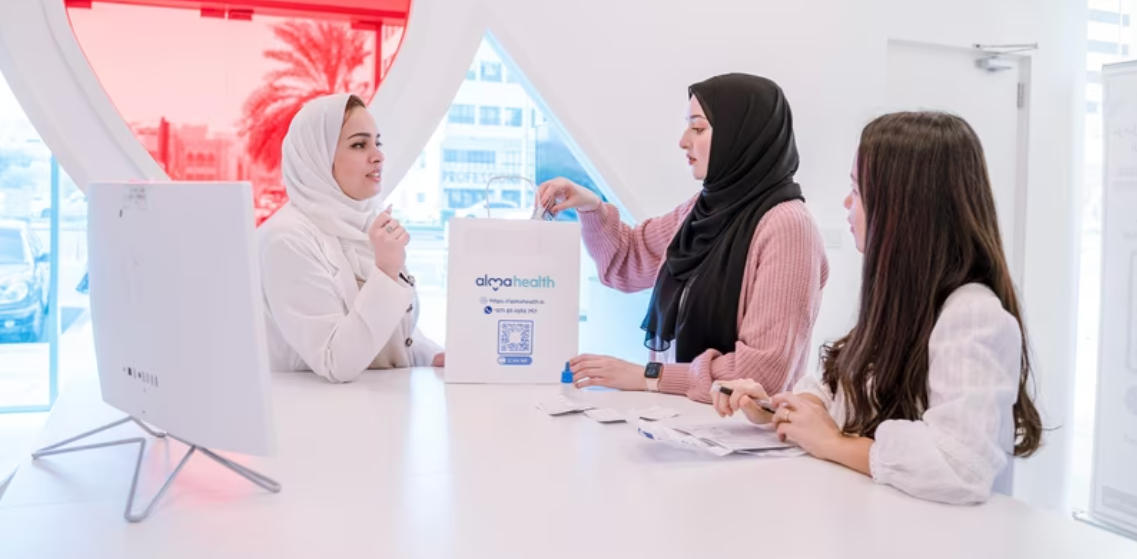The HealthTech startup intends to build on its achievement in Abu Dhabi and increase its user base in Saudi Arabia and Dubai.
Khaldoon Bushnaq, a software developer, and Tariq Seksek launched Alma Health in the midst of the Covid-19 outbreak in 2020.
The moment was right to start a business that would benefit those with chronic illnesses.
Through its smartphone application, Alma Health, a direct-to-patient digital healthcare platform, offers direct medical consultations to people with diseases like diabetes, hypertension, high cholesterol, and asthma.
The business, headquartered in Abu Dhabi Global Market, offers lab testing that can be completed at home and has a staff of qualified general practitioners on hand.
The technology, which was a part of Hub 71’s initial cohorts, also enables patients to complete their prescriptions without having to travel to a clinic or a hospital, with full coverage by the user’s health insurer.
Both co-founders have degrees in software engineering and have experience working in the UAE’s thriving business community.
Mr. Bushnaq, the head of strategy and business performance at Careem, earned his engineering degree from Carleton University in Canada and his MBA from the University of Cambridge in 2015.
A University of Western Ontario engineering graduate, Mr. Seksek has held product management positions with businesses like Dubizzle and Starzplay in the past.
The two created a strategy based on their corporate expertise and the disruptive impact of technology on various sectors in an effort to differentiate Alma’s solutions.
Their business case for speeding the development of services for persons with chronic diseases in the region was bolstered by the high smartphone penetration rates in the area.
“I realized the effect that technology had on transportation industries in the UAE, Saudi Arabia, and in the other parts of the region during my tenure at Careem between 2016 and 2020,” says Mr. Bushnaq, who is also the company’s chief executive.
“I have a very strong core conviction that many technology companies and services will solve a significant problem for the population and will experience a very rapid adoption rate,” the author says.
Although the pandemic was a trying period for everyone, he adds it was also a chance to learn an important lesson: to be ready for the next pandemic or endemic.
According to Mr. Bushnaq, “the two critical trends we have observed and strongly capitalized on to start a digital health care business are: the regulators’ agility to licence digital health care providers, doctors’ rapid adoption of digital health, and patients’ rising expectations from their health care providers.”
Mr. Bushnaq, who has a chorionic problem himself, could see that there were numerous chances for transformation and simplification.
For instance, if the condition is stable, there is no need to visit the hospital to renew and refill a prescription.
Alma offers a substitute, but the platform’s value proposition outweighs that of the other telemedicine providers in the region and the United Arab Emirates.
“Our business model is quite different from that of a normal telemedicine company, where a physician may or may not work for the business. These medical professionals work for Alma Health. This enables us to provide our members a high-quality, customized care plan, he claims.
The Department of Health in both Abu Dhabi and Dubai has granted the company’s workers and physicians a license. Part-time professionals are also registered by their local health authorities.
According to a recent research by Dealroom, an Amsterdam-based provider of data and insight on start-ups and digital ecosystems, health tech start-ups in the Mena region are booming, having garnered more than $400 million in VC funding since 2016.
According to Dealroom, the region’s HealthTech companies currently have an enterprise value of more than $1.7 billion, a growth of 8 times since 2017.
The amount invested in health technology in Mena last year increased to $106 million from $73 million. The UAE got the most venture capital funding in Mena between 2018 and 2022 ($192.7 million).
According to Dealroom, the telemedicine and biotechnology sectors have garnered the most VC funding thus far since 2018.
Alma Health, which is a member of the Department of Health’s Technology Hub in Hub 71, has benefited greatly from the regulator’s advice on how to set up online pharmacies and clinics as well as how to acquire the appropriate licenses to provide consumers with safe and high-quality healthcare.
According to Mr. Bushnaq, “this region of the world has one of the highest prevalence rates of chronic conditions worldwide and it’s time for a serious push to improve access to health care.”
He claims that as many as 120 million people in Mena currently struggle with chronic diseases and frequently rely on a primary care system that is ineffective and has not undergone significant adjustment in more than a century.
There are 15 million people in Saudi Arabia who have at least one chronic disease which is highest in the region.
“There are only 13 general practitioners and one pharmacist for every 10,000 people in Saudi Arabia, despite the fact that persons with chronic conditions see a doctor at least four times a year and need at least eight prescriptions filled. In sharp contrast, the US has eight pharmacists and 26 general practitioners per 10,000 people, he notes. According to Mr. Bushnaq, health care spending will have climbed three times in the United Arab Emirates and 3.5 times in Saudi Arabia between 2004 and 2020 as a result of the annual increases in the prevalence of diabetes, heart disease, obesity, asthma, and other ailments.
However, regional authorities pay careful attention and are continually updating legislation to make it easier for people with certain illnesses to get health care.
The business will keep its primary emphasis on chronic care.
Through our coverage of their end-to-end journey guided by our skilled and specialized physicians, “we have clear indications that we are successfully changing the lives of people living with chronic conditions.”

